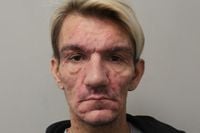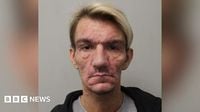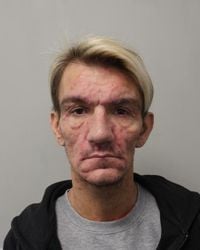Jonathan Carl, a 42-year-old former hairdresser from Hornchurch, east London, has been sentenced to 17 years in prison after being found guilty of rape and the reckless transmission of HIV, in a case that has sent shockwaves through the LGBTQ+ community and beyond. The conviction, handed down at Snaresbrook Crown Court in August 2025, followed a meticulous investigation by the Metropolitan Police that uncovered a disturbing pattern of predatory behavior spanning at least four years.
The story began to unravel when two of Carl’s victims, who had met socially, realized they had both experienced eerily similar encounters with the same man. Their decision to report their suspicions to Romford police station in January 2024 triggered an investigation that would eventually reveal the full extent of Carl’s actions. According to The Standard, detectives used digital download examinations and location data to identify Carl, leading to his arrest and subsequent charges of rape and grievous bodily harm.
What investigators found was staggering. Through in-depth analysis of Carl’s mobile phone and social media accounts, officers discovered that he had used popular gay dating apps, including Grindr and Scruff, to contact more than 400 men between 2019 and 2023. These contacts ranged in age from 17 to 60, and police believe that Carl had sexual contact with a significant portion of them. As Detective Superintendent Lewis Basford told the BBC, “More alarming was the message contents which highlighted to us that there were victim-survivors out there of rape where he had met individuals and subsequently they were messaging him and challenging him on some of the acts that we would define as rape.”
So far, at least 82 men have been identified and fast-tracked into the NHS for urgent screening after being informed of Carl’s HIV-positive status. Authorities fear, however, that as many as 318 men may still be unaware of their exposure and are urging anyone who may have met Carl—particularly through online platforms or at his distinctively located home above a fish and chip shop in Hornchurch—to come forward for testing and support. Detective Chief Inspector Sarah Bishop, who led the investigation, emphasized, “Our investigation uncovered the scale of Carl’s offending and ensured he was brought to justice. But we remain extremely concerned about the wellbeing of those who have not yet been identified. We believe as many as 318 men may be a victim, and might need to come forward for testing and support.”
The impact on Carl’s victims has been profound and lasting. One man described to police the psychological toll of his experience, saying, “It made me feel like I didn’t matter, it made me feel less than human. The main reason I came forward to police is because I wanted to stop this from happening to anyone else.” Another victim spoke of the enduring stigma and guilt he now faces: “It has damaged me from having any sort of romantic relationship in the future, due to people’s overall thoughts on HIV. It makes me fry my brain as I overthink about what I could have done differently. I still struggle with this guilty feeling.”
Police have made it clear that Carl’s actions were not only predatory but also reckless in the eyes of the law. Under the Offences against the Person Act, intentionally or recklessly transmitting a sexually transmitted infection constitutes grievous bodily harm. As Det Supt Basford explained to the BBC, “During all of the encounters and interactions he had with individuals, he also chose to lie about his status. Whilst the law doesn’t require an individual to provide that status to anyone that they may meet, what we can prove is that, in essence, he was reckless in terms of his transmission, knowing all of those facts.” Basford further noted that Carl “made the decision not to take the medication” for his HIV, exacerbating the risk to others.
Carl’s conviction comes with a 15-year sexual prevention order, mandating that he notify police within three days of having a new sexual partner and disclose his HIV status if he is not on medication. The order is designed to prevent further harm and ensure that any future partners are aware of the risks involved.
The Metropolitan Police, in partnership with NHS services and charities, have launched an extensive outreach campaign to encourage potential victims to seek confidential testing, advice, and support. “Your health and wellbeing are our absolute priority,” said Detective Bishop, addressing those who may be affected. Police have provided dedicated contact numbers and email addresses for survivors, and support is also available through organizations such as Galop, Positive East, NAT, The Havens, and SARCs. For those wishing to remain anonymous, Crimestoppers can be contacted at 0800 555 111.
Yet, the case has also highlighted deeper issues of trust between the LGBTQ+ community and law enforcement. According to the most recent figures from the Mayor’s Office for Policing and Crime, trust in the Metropolitan Police among LGBTQ+ individuals is the lowest of any community, standing at just 58%. This skepticism is rooted in a history of police failures in east London, most notably the mishandling of the Stephen Port serial killings between 2014 and 2015—a tragedy that led to widespread criticism and a 2023 warning from a watchdog about the Met’s shortcomings in investigating unexpected deaths.
Police acknowledge the challenge of rebuilding this trust and are committed to ensuring that “every victim-survivor has a choice and a decision” about whether to speak to authorities or seek medical help. Det Supt Basford stressed the importance of a victim-centered approach: “We have messages and content which would lead us to say that there are victims of rape out there who have not come forward to the police.”
The case of Jonathan Carl stands as a stark reminder of the dangers posed by individuals who exploit digital platforms to target vulnerable people. It also underscores the urgent need for robust safeguards, comprehensive support networks, and a justice system that puts victims first. As police continue their outreach, the hope is that more survivors will feel empowered to step forward, seek help, and begin the process of healing.
For now, the Metropolitan Police, NHS partners, and advocacy groups are working tirelessly to identify and support every potential victim, determined not to let anyone fall through the cracks again.



